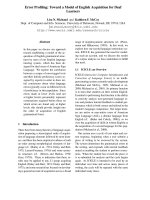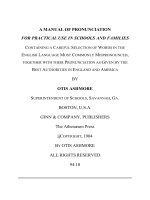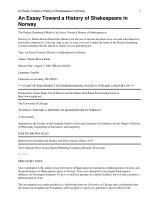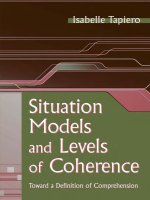the mit press toward a science of consciousness iii the third tucson discussions and debates oct 1999
Bạn đang xem bản rút gọn của tài liệu. Xem và tải ngay bản đầy đủ của tài liệu tại đây (3.57 MB, 455 trang )
Pagei
TowardaScienceofConsciousnessIII
Pageii
ComplexAdaptiveSystems
(selectedtitles)
JohnH.Holland,ChristopherG.Langton,andStewartW.Wilson,advisors
AnIntroductiontoGeneticAlgorithms, MelanieMitchell
CatchingOurselvesintheAct:SituatedActivity,InteractiveEmergence,andHumanThought, HorstHendriks-
Jansen
ElementsofArtificialNeuralNetworks, KishanMehrotra,ChilukuriK.Mohan,andSanjayRanka
AdvancesinGeneticProgramming,Volume2, editedbyPeterJ.AngelineandKennethE.Kinnear,Jr.
GrowingArtificialSocieties:SocialSciencefromtheBottomUp, JoshuaM.EpsteinandRobertAxtell
AnIntroductiontoNaturalComputation, DanaH.Ballard
FourthEuropeanConferenceonArtificialLife, editedbyPhilHusbandsandInmanHarvey
TowardaScienceofConsciousnessII:TheSecondTucsonDiscussionsandDebates, editedbyStuartR.
Hameroff,AlfredW.Kaszniak,andAlwynC.Scott
AnIntroductiontoFuzzySets:AnalysisandDesign, WitoldPedryczandFernandoGomide
FromAnimalstoAnimats5:ProceedingsoftheFifthInternationalConferenceonSimulationofAdaptive
Behavior, editedbyRolfPfeifer,BruceBlumberg,Jean-ArcadyMeyer,andStewartW.Wilson
ArtificialLifeVI:ProceedingsoftheSixthInternationalConference, editedbyChristophAdami,RichardK.
Belew,HiroakiKitano,andCharlesE.Taylor
TheSimpleGeneticAlgorithm:FoundationsandTheory, MichaelD.Vose
AdvancesinGeneticProgramming:Volume3, editedbyLeeSpector,WilliamB.Langdon,Una-MayO'Reilly,
andPeterJ.Angeline
TowardaScienceofConsciousnessIII:TheThirdTucsonDiscussionsandDebates, editedbyStuartR.
Hameroff,AlfredW.Kasniak,andDavidJ.Chalmers
Pageiii
TowardaScienceofConsciousnessIII
TheThirdTucsonDiscussionsandDebates
editedbyStuartR.Hameroff,AlfredW.Kaszniak,andDavidJ.Chalmers
Pageiv
©1999MassachusettsInstituteofTechnology
Allrightsreserved.Nopartofthisbookmaybereproducedinanyformbyanyelectronicormechanicalmeans
(includingphotocopying,recording,orinformationstorageandretrieval)withoutpermissioninwritingfromthe
publisher.
ThisbookwassetinTimesNewRomanbyAscoTypesetters,HongKong
PrintedandboundintheUnitedStatesofAmerica.
Library of Congress Cataloging-in-Publication Data
Toward a science of consciousness III : the third Tucson discussions and debates / edited by Stuart R.
Hameroff, Alfred W. Kaszniak, David J. Chalmers.
p. m. — (Complex adaptive systems)
"A Bradford book."
Conference proceedings.
Includes bibliographical references and index.
ISBN 0-262-58181-7 (alk. paper)
1. Consciousness—Congresses. I. Hameroff, Stuart R. II. Kaszniak, Alfred W., 1949– .
III. Chalmers, David John, 1966– . IV. Title: Toward a science of consciousness three. V. Title:
Third Tucson discussions and debates.
BF311.T67 1999
153—dc21 99-36574
CIP
Pagev
ATREETICKLESITSBRANCHES
CarolEbbecke
We are the laughing rats.
Our private approaches to reflection still require
a second perspective.
We can clearly see through our psychoscope
the hot spot of vision and awareness
our perception of the vision at hand
versus science itself—
a cat versus a kitten, a model versus a reality.
A scan will tell us, second hand,
that no amount of mythmaking will maintain
a memory of private subjectivity in the mind's past.
Moony blue rays on the mountainscape lasso
the self in the name of qualia,
the synchronicity of the coyote's rapture
a shaman caught in the feather of physicality.
Awareness invariably entails awareness
of something, the mechanics of variables,
fuzzy virtual memory eludes the paradigm.
Rescind the sensory, dreams are the stories
we tell upon waking—experience
plus explanation . . .
Fire of the breathless continuum begs the answer:
can I know you through one eye?
and opens a non-human border to the mind,
captures language before we can focus the space,
or consider the time.
Pagevii
CONTENTS
Acknowledgments
xiii
Contributors
xv
Preface
xix
I
TheExplanatoryGap
Introduction
DavidJ.Chalmers
1
1
Conceivability,Identity,andtheExplanatoryGap
JosephLevine
3
2
ConceivingBeyondOurMeans:TheLimitsofThoughtExperiments
RobertVanGulick
13
3
RealisticMaterialistMonism
GalenStrawson
23
4
OntheIntrinsicNatureofthePhysical
GreggH.Rosenberg
33
II
Color
Introduction
DavidJ.Chalmers
49
5
OfColorandConsciousness
StephenPalmer
51
6
ColorQualityandColorStructure
C.LarryHardin
65
7 75
PseudonormalVisionandColorQualia
MartineNida-Rumelin
III
NeuralCorrelates
Introduction
AlfredW.Kaszniak
85
8
TowardaCognitiveNeuroscienceofConsciousness
AnttiRevonsuo
87
Pageviii
9
NeuralCorrelatesofHallucinogen-InducedAlteredStatesof
Consciousness
F.X.Vollenweider,A.Gamma,andM.F.I.Vollenweider-
Scherpenhuyzen
99
10
FirstStepstowardaTheoryofMentalForce:PETImagingofSystematic
CerebralChangesafterPsychologicalTreatmentofObsessive-
CompulsiveDisorder
JeffreyM.Schwartz
111
IV
VisionandConsciousness
Introduction
DavidJ.Chalmers
123
11
TheVisualBraininAction
A.DavidMilnerandMelvynA.Goodale
127
12
InSearchofImmaculatePerception:EvidencefromMotor
RepresentationsofSpace
YvesRossetti
141
13
Attending,Seeing,andKnowinginBlindsight
RobertW.Kentridge,C.A.Heywood,andLarryWeiskrantz
149
14
InsightsintoBlindsight
A.DavidMilner
161
15
FromGraspingtoLanguage:MirrorNeuronsandtheOriginofSocial
Communication
VittorioGallese
165
16
Supportingthe"GrandIllusion"ofDirectPerception:ImplicitLearning
inEye-MovementControl
FrankH.Durgin
179
17
SelectivePeripheralFading:HowAttentionLeadstoLossofVisual
Consciousness
LianggangLou
189
V
Emotion
Introduction
AlfredW.Kaszniak
197
Pageix
18
ConsciousExperienceandAutonomicResponsetoEmotionalStimuli
FollowingFrontalLobeDamage
AlfredKaszniak,SherylL.Reminger,StevenZ.Rapcsak,andElizabeth
L.Glisky
201
19
AttheIntersectionofEmotionandConsciousness:Affective
NeuroscienceandExtendedReticularThalamicActivatingSystem
(ERTAS)TheoriesofConsciousness
DouglasF.Watt
215
20
LaughingRats?PlayfulTicklingArousesHigh-FrequencyUltrasonic
ChirpinginYoungRodents
JaakPankseppandJeffreyBurgdorf
231
VI
245
EvolutionandFunctionofConsciousness
Introduction
StuartR.Hameroff
21
ThePrivatizationofSensation
NicholasHumphrey
247
22
FlaggingthePresentMomentwithQualia
RichardL.Gregory
259
23
IfQualiaEvolved . . .
A.GrahamCairns-Smith
271
24
HandaxesandIceAgeCarvings:HardEvidencefortheEvolutionof
Consciousness
StevenMithen
281
25
EphemeralLevelsofMentalOrganization:DarwinianCompetitionsasa
BasisforConsciousness
WilliamH.Calvin
297
VII
PhysicalRealityandConsciousness
Introduction
StuartR.Hameroff
309
26
WhatDoesQuantumMechanicsImplyabouttheNatureoftheUniverse?
ShimonMalin
313
Pagex
27
QuantumMonadology
KunioYasue
317
28
TheInterfaceinaMixedQuantum/ClassicalModelofBrainFunction
ScottHaganandMasayukiHirafuji
329
VIII
TheTimingofConsciousExperience
Introduction
StuartHameroff
341
29
DoApparentTemporalAnomaliesRequireNonclassicalExplanation?
StanleyA.Klein
343
30
AQuantumPhysicsModeloftheTimingofConsciousExperience
FredA.Wolf
359
31
ConsciousandAnomalousNonconsciousEmotionalProcesses:A
ReversaloftheArrowofTime?
DickJ.BiermanandDeanRadin
367
IX
Phenomenology
Introduction
AlfredKaszniak
387
32
ExploringActualitythroughExperimentandExperience
PietHut
391
33
Intersubjectivity:ExploringConsciousnessfromtheSecond-Person
Perspective
ChristiandeQuincey
407
34
GoetheandthePhenomenologicalInvestigationofConsciousness
ArthurZajonc
417
35
EssentialDimensionsofConsciousness:Objective,Subjective,and
Intersubjective
FrancesVaughan
429
36 441
TrainingtheAttentionandExploringConsciousnessinTibetan
Buddhism
B.AlanWallace
Pagexi
37
TranspersonalandCognitivePsychologiesofConsciousness:A
NecessaryandReciprocalDialogue
HarryT.Hunt
449
38
BiogeneticStructuralTheoryandtheNeurophenomenologyof
Consciousness
CharlesD.Laughlin
459
39
ExperientialClarificationoftheProblemoftheSelf
JonathanShear
475
Index
489
Pagexiii
ACKNOWLEDGMENTS
Theeditorswouldliketoexpresstheirappreciationtoallofthehard-workingpeoplewhoputintimeandeffort
everydayinordertokeeptheTucsonconferencesandrelatedactivitiesrunningsmoothly.CarolEbbecke,our
editorialassistantandpoetryslammistress,hasnowguidedtwoTucsonvolumestopress.Withouther
organizationalskills,communication,andaesthetictastethesebookswouldnotbepossible.TheFetzerInstitute
continuestoprovidegeneroussupportforourendeavors.OurforthcomingCenterforConsciousnessStudies,
whichwouldnotbeinitscurrentguisewithoutFetzer'sinput,ispartandparcelofallofourpresentandfuture
Tucsonconferences.The JournalofConsciousnessStudies and TrendsinCognitiveScience havegenerously
permittedustoreprintmaterialfromtheirpages.TheProgramCommittee,includingChristofKoch,Marilyn
Schlitz,AlScott,PetraStoerig,KeithSutherland,MichaelWinkelman,andJimLaukes,scatteredallaroundthe
world,cametogetherbye-mailandinTucsontoassemblethemulti-disciplinaryline-upfortheconference.
ArtistDaveCantrellre-createdsomeofthetrickierfigures,andAlScottgaveushisblessingandturnedhis
editorshipovertoDaveChalmersbeginningwiththisbook.Finally,JimLaukeskeptthestarchinoursailsand
alwaysmadecertainthatwecoulddeliveronwhatwepromisedthoughhisattentiontoeveryimaginabledetail.
WemustalsothankourfamiliesandcolleaguesinourhomedepartmentsofAnesthesiology,Psychology,
Neurology,Psychiatry,andPhilosophy,andtheUniversityofArizonaforprovidinganacademicenvironment
amenabletoourintellectualpursuits.
Finally,wearegratefultoBradfordBooksandtheMITPressfortheircontinuedsupport.Inparticularwe
thankBettyStantonforherstewardship,visionandcourageincontinuinginherlatehusband'srole.
Pagexv
CONTRIBUTORS
DickBierman
UniversityofAmsterdam
Roetersstraat15
1018WBAmsterdam,TheNetherlands
JeffreyBurgdorf
Dept.ofPsychology
BowlingGreenStateUniversity
BowlingGreen,OH43403
A.G.Cairns-Smith
DepartmentofChemistry
GlasgowUniversity
GlasgowG128QQ
Scotland,UK
WilliamH.Calvin
DepartmentofPsychiatryand
BehavioralSciences
UniversityofWashington
SeattleWA98195-1800
DavidJ.Chalmers
DepartmentofPhilosophy
TheUniversityofArizona
Tucson,AZ85721
ChristiandeQuincey
InstituteofNoeticSciencesandtheJohn
F.KennedyUniversity
IONS,475GateFiveRoad,Suite300
Sausalito,CA94965
FrankH.Durgin
DepartmentofPsychology
SwarthmoreCollege
500CollegeAvenue
Swarthmore,PA19081
CarolEbbecke
DepartmentofEnglish
TheUniversityofArizona
Tucson,AZ85721
VittorioGallese
InstituteofHumanPhysiology
UniversityofParma
viaGramsci,14-I43100Parma,Italy
AlexGamma
PsychiatricUniversityHospitalZürich
ResearchDepartment
Box68
CH-8029Zürich,Switzerland
ElizabethL.Glisky
DepartmentofPsychology
TheUniversityofArizona
Tucson,AZ85721
MelvynA.Goodale
TheUniversityofWesternOntario
DepartmentofPsychology
SocialScienceCentre
London,OntarioN6A5C2,Canada
RichardL.Gregory
UniversityofBristol
DepartmentofExperimentalPsychology
8WoodlandRoad
BristolBS81TN,UK
ScottHagan
ComputationalModelingLab
Dept.ofInformationScience,N.A.R.C.
3-1-1Kannondai,Tsukuba,Ibaraki,
305Japan
StuartR.Hameroff
DepartmentofAnesthesiology
ArizonaHealthSciencesCenter
Tucson,AZ85724
C.LarryHardin
DepartmentofPhilosophy
SyracuseUniversity
Syracuse,NY13244
CharlesA.Heywood
DepartmentofPsychology
ScienceLaboratories
SouthRoad,Durham,DH13LE,UK
MasayukiHirafuji
ComputationalModelingLab
Dept.ofInformationScience,N.A.R.C.
3-1-1Kannondai,Tsukuba,Ibaraki,
305Japan
Pagexvi
NicholasHumphrey
DepartmentofPsychology
NewSchoolforSocialResearch
65FifthAvenue
NewYork,NY10003
HarryT.Hunt
DepartmentofPsychology
BrockUniversity
St.Catherines,Ontario
L2S3A1Canada
PietHut
InstituteforAdvancedStudy
OldenLane
Princeton,NJ08540
AlfredW.Kaszniak
DepartmentsofPsychologyand
Psychiatry
TheUniversityofArizona
Tucson,AZ85721
RobertW.Kentridge
DepartmentofPsychology
ScienceLaboratories
SouthRoad,Durham,DH13LE,UK
StanleyA.Klein
VisionScience
UniversityofCalifornia,Berkeley
Berkeley,CA94720-2020
CharlesD.Laughlin
DepartmentofSociologyand
Anthropology
CarletonUniversity
Ottawa,Ontario,CANADAK1S5B6
and
InternationalConsciousnessResearch
Laboratories(ICRL)
JosephLevine
NorthCarolinaStateUniversity
DepartmentofPhilosophyandReligion
Raleigh,NC,27695
LianggangLou
DepartmentofPsychology
TheUniversityofHongKong
PokfulamRoad
HongKong
ShimonMalin
DepartmentofPhysicsandAstronomy
ColgateUniversity
13OakDrive
Hamilton,NY13346
A.DavidMilner
SchoolofPsychology
UniversityofStAndrews
FifeKY169JU
Scotland,UK
StevenMithen
DepartmentofArchaeology
UniversityofReading
Whiteknights
POBox218
ReadingRG66AA,UK
MartineNida-Rümelin
InstitutfurPhilosophie,Logikund
Wissenschaftstheorie
Ludwigstrasse31
80539Munich,Germany
StephenE.Palmer
DepartmentofPsychology
UniversityofCaliforniaatBerkeley
Berkeley,CA94720
JaakPanksepp
Dept.ofPsychology
BowlingGreenStateUniversity
BowlingGreen,OH43403
DeanRadin
IntervalResearchCorporation
1801PageMillRoad,BuildingC
PaloAlto,CA94304
StevenZ.Rapcsak
DepartmentofPsychology
TheUniversityofArizona
Tucson,AZ85721
Pagexvii
SherylL.Reminger
DepartmentofPsychology
TheUniversityofArizona
Tucson,AZ85721
AnttiRevonsuo
DepartmentofPhilosophy
CenterforCognitiveNeuroscience
UniversityofTurku
FIN-20014Turku,Finland
GreggH.Rosenberg
ArtificialIntelligenceCenter
TheUniversityofGeorgia
Athens,GA30602
YvesRossetti
EspaceetAction
INSERM94
16,avenuedoyenLepine
case13
F-69676BRONCEDEXFRANCE
JeffreyM.Schwartz,M.D.
UCLADepartmentofPsychiatry
760WestwoodPlaza
Room67-468
LosAngeles,CA90024-1759
JonathanShear
Dept.ofPhilosophy
VirginiaCommonwealthUniversity
Richmond,VA23284
GalenStrawson
DepartmentofPhilosophy
OxfordUniversity
10MertonStreet
OxfordOX14JJ,UK
RobertVanGulick
Dept.ofPhilosophy
541HallofLanguages
SyracuseUniversity
Syracuse,NY13244-1170
FranzX.Vollenweider
PsychiatricUniversityHospitalZurich
ResearchDepartment
Box68
CH-8029Zurich,Switzerland
MargreetF.I.Vollenweider-
Scherpenhuyzen
UniversityHospitalofZurich
DepartmentofAnesthesiology
Rämistrasse100
CH-8092Zurich,Switzerland
B.AlanWallace
DepartmentofReligiousStudies
UniversityofCaliforniaSantaBarbara
SantaBarbara,CA93106
DouglasF.Watt
DirectorofNeuropsychology
QuincyHospital
Quincy,MA02169
LawrenceWeiskrantz
DepartmentofPsychology
ScienceLaboratories
SouthRoad,Durham,DH13LE,UK
FredAlanWolf
HaveBrains/WillTravel
43515thAvenue,#3
SanFrancisco,CA94118-2828
KunioYasue
ResearchInstituteforInformaticsand
Science
NotreDameSeishinUniversity
2-16-9Ifuku-cho,Okayama700-8516,
Japan
ArthurZajonc
DepartmentofPhysics
AmherstCollege
Amherst,MA01002
Pagexix
PREFACE
Whatisconsciousness?Howandwhydowehaveconsciousexperience,aninnerlifetexturedandcomprisedof
thefeelingsandsensationsthatphilosopherscall''qualia"?Asanewmillenniumbeckons,thesequestionshave
emergedfromalongdarknessthatdominatedpsychologyformuchofthelastcentury.Thisinternationaland
interdisciplinaryintrospectionhasstemmedinpartfromanumberofhigh-profilebooksinthearea,inpartfrom
adevelopmentofnewexperimentaltechniquesforaddressingtheproblem,andinpartsimplyfromasensethat
nowisthetimeforthescienceofthemindtoaddressitscentralandmostdifficultproblem.
Themostburningissueisthatofwhetherconsciousexperience—feelings,qualia,our"innerlife"—canbe
accommodatedwithinpresent-dayscience.Manyseeconsciousexperienceasjustanotherphysicalprocessin
thebrain.Othersseeconsciousexperienceasoutsidescience,orbelievethatsciencemustexpandtoinclude
experience.ThesephilosophicalbattlelineswereoriginallydrawnbetweenSocrates,whobelievedthatthe
"cerebrumcreatedconsciousness,"andDemocritus,whoarguedthatmentalprocesseswerefundamental
constituentsofreality.
Ridingandfacilitatingthelatetwentiethcenturywaveofinterestinthenatureofconsciousexperience,three
interdisciplinaryandinternationalTucsonconferences(TowardaScienceofConsciousness)havebeenheldin
1994,1996,and1998(thefourthisscheduledforApril10–15,2000).Theconferenceshavebeenintegrative,
attemptingtoassimilateandsynthesizeavarietyofapproachestowardunderstandingtheconsciousmind.Five
majorareasaredelineated:philosophy,neuroscience,cognitivescience,math/physics/biology,andexperiental/
culturalapproaches.Theideafromthebeginninghasbeentobringproponentsandresearchersineachofthese
areasunderonetent,toavoidtunnelvisioninthistrickyandpotentiallyoverwhelmingmystery.
ThefirstTucsonconferencein1994wasrelativelysmallandtentative.Couldaninterdisciplinaryconsciousness
conferencework?Wouldproponentsofthevariedapproachesbeabletocommunicate,orwouldthegathering
degenerateintoamodernTowerofBabel?"TucsonI"succeededbeyondexpectations,andasecond,expanded
TucsonIIwasheldin1996,movingfromtheUniversityofArizonacampustothelargerfacilitiesattheTucson
ConventionCenterandMusicHall.Manyofthecentralfiguresinthenewlyformingfieldofconsciousness
studieswereinvitedandparticipated,andtheissueswerefiercelydebatedamid1000attendees,producing
numerousprintandelectronicreports.FollowingTucsonII,morefocusedconferencesonconsciousnesssprang
upacrosstheglobe.Consciousnesshadbecomepartoftheconsciousnessofthescientificworld.
FollowingthegiddinessofTucsonII,questionsaroseaboutthefutureofthefield.Thehistoryofpsychologyis
repletewithflashes-in-the-pan,newmovementsand
Pagexx
ideasthatdidnotsustain.Couldastable,self-sustainingscienceofconsciousnessgetofftheground?Could
modernneuroscience,cognitivescience,physics,andotherfieldsraiseenoughnewideastomaintaintheinterest
ofascientificcommunitywithashortattentionspanandanimpatienceforresults?
Withtheseconsiderationsinmind,organizersoftheTucsonIIIconferencemadesomedecisions.First,in
responsetonumerousrequests,workintheareasofculturalanthropologyandaestheticswereincorporated.
Second,allabstractssubmittedforpresentationwerereviewedtoahigherstandardthanforTucsonII.Third,
theTucsonIIIconferencefocusedcentrallyondata—experimentalresultsrelevanttoconsciousness.Theresult
wasaconferencethatwasnotasfieryasTucsonII,butwhichshowcasedthesolidscientificprogressinthe
studyofconsciousnessonnumerousfronts.Moretalkswereevolutionarythanrevolutionary,whichwetaketo
beasignthatthisyoungfieldistakingsomestepstowardmaturity.Therehasbeenconsiderableprogress,
especiallyinthestudyofneuralcorrelatesofconsciousness(especiallyvisualconsciousness),andofthecontrast
betweenconsciousandunconsciousprocesses.Ofcoursethereisstillmuchroomforboldideasandfor
passionatedebate,andweexpectnoshortageofthosethingsatfuturemeetings.
TheTucsonIIIconferenceopenedonApril17,1998,withanannouncementthattheFetzerInstitutehad
awarded$1.4milliontotheUniversityofArizonatoestablishaCenterforConsciousnessStudies.TheCenter
isintendedtocontinueandexpandeffortsbegunwiththeconferencesandrelatedprojects,onlinecourses,
visitingscholarsandresearchawards(ten$20,000grantsperyearforstudiesinvariousfieldsaimeddirectlyat
theproblemofconsciousness).
Onalighternote,theconferenceconcludedwiththefirsteverConsciousnessPoetrySlam,organizedand
masterfullycomperedbypoetCarolEbbecke.Thisincludedthefirstpublicperformanceofthe"ZombieBlues,"
anevolvingcommentaryoncentralissuesinthefieldbyaragtagbunchofconsciousnessscholars.
ThisbookisthethirdinaseriesaccompanyingtheTucsonconferences,andisacollectionofchaptersfrom
amongpaperspresentedattheconference.Theywereinvitedbasedonauthors'recognizedexpertise,qualityof
thework,andtheirplaceinabalancedrepresentationofmaterialfillingoutthespectrumofapproachesto
consciousness.Thechaptersaredividedintothematicsections,eachprecededbysomeintegrativesummary
remarks.
Page1
I—
THEEXPLANATORYGAP—INTRODUCTION
DavidJ.Chalmers
Itisnaturaltohopethatanexplanationofconsciousnessmightbeaphysicalexplanation.Physicalexplanations
havehadextraordinarysuccesselsewhereinscience.Inbiology,chemistry,geology,physiology,andevenin
aspectsofpsychology,wehavefoundthatphysicalanalysescanaccountforallsortsofphenomenaina
reasonablycompleteandsatisfyingway.Giventhistrackrecord,onemightwellexpectthataphysical
explanationofconsciousnessisonitsway.Andindeed,investigationoftheneurophysiologicalbasisof
consciousnesshasalreadyyieldedmanyinsightsintothephenomenon.
Butsomehavearguedthatanypurelyphysicalexplanationofconsciousnesswillbeincomplete.
Neurophysiologywillverylikelyyieldasystematiccorrelationbetweenstatesofthebrainandstatesof
consciousness,butwillthiscorrelationbeacompleteexplanation?Ithasoftenbeensuggestedthatnophysical
accounttellsuswhythereshouldbestatesofsubjectiveexperience—thedirectexperienceofcolors,pains,
emotions,andotherphenomenologicalaspectsofourmentallives.Givenanyphysicalaccount,onecanaskwhy
that processshouldyieldconsciousness;andmanyhavesuggestedthataphysicaltheoryalonecannotanswer
thisquestion.
Onecanargue,forexample,thatitisaleastinternallyconsistenttosupposethattherecouldbeabeing
physicallyidenticaltooneofus,butwhoisnotconsciousatall.Thisisanoddpossibility,andthereislittle
reasontobelieveitcorrespondstoanythingintheactualworld,butitisarguablyatleast logically possible,in
thatthenotionisnotcontradictory.Ifso,thissuggeststhatphysicaltheoryislogicallycompatiblewithboththe
presenceandtheabsenceofconsciousness.Andthisinturnsuggeststhatnopurelyphysicaltheorycanexplain
whyconsciousnessexistsinthefirstplace.Levine(1983)hasputthepointbysayingthatthereisan
explanatorygap betweenphysicalprocessesandconsciousexperience.
Theoristsofconsciousnessaredividedbothonwhetherthereisanexplanatorygap,andonwhatfollows.Some
denythatthereisanygap,orsuggestthatithasalreadybeenclosed.Itisprobablyfairtosay,however,that
mostthinkthatthereisatleastaprimafacie explanatorygap.Fromhere,somegoontoarguethat
consciousnessisnotawhollyphysicalphenomenon,whileothersresistthisconclusion.
Thefourcontributorstothissectionallacceptthatthereisatleastaprimafacie explanatorygap,buttheydiffer
inwheretheygofromthere.Indifferentways,eachofthemislookingforawaytoaccommodateconsciousness
withinaphysicalviewoftheworld,whilestilltakingthefirst-personphenomenaasreal.Thisleadsdown
numerousinterestingpathways.
Page2
JosephLevine,whointroducedtheterm explanatorygap, thinksthatthegapmaybeuncloseable,butthat
consciousnessmaybephysicalallthesame.Thatis,thereisanepistemologicalgap,butnoontologicalgap.In
thischapter,heanalyzestherootsofthegap.Inparticular,heinvestigateshowitcanbethatgiventhatwater
andconsciousnessarebothphysicalprocesses,onecanbeexplainablewhiletheotherisnot.
RobertVanGulickholdsthatthereisaprimafacie explanatorygap,butthatitmayeventuallybeclosed.To
closetheexplanatorygap,weneedtoreviseourconcepts,inawaythatwecannotyetanticipate.Withsucha
revision,itmaynolongerseeminternallyconsistenttosupposethatanyphysicalprocesscouldtakeplace
withoutconsciousness.HeusesthisideatoaddresssomeargumentsbyChalmers(1996)fortheconclusionthat
consciousnessisnonphysical.
GalenStrawson,whose1994bookdiscussestheproblemsofexperienceindepth,holdsthatexperiential
phenomenaarephysical.Butthisdoesnotmeanweneedtodeflateexperiencetosomethinglessthanitis;
rather,wehavetoexpandourconceptofthephysical.Hearguesthatthereismoretothephysicalworldthan
physicaltheoryspecifies.Onceweunderstandthephysicalasitisinitself,ratherthanasdescribedbyphysical
theory,wewillseethatithasroomforexperienceinitsunderlyingintrinsicnature.Hecallstheresulting
position"realisticmonism."
GreggRosenbergpursuesarelatedidea,arguingthatwehaveto"re-enchant"ourconceptionofthephysical
worldforreasonsthatareindependentofconsciousness,andthatoncewedoso,wewillseehowconsciousness
canfitin.BymakingananalogywithConway'sgameofLife,hearguesthatourtheoryofthephysicalworldis
incomplete:itspecifiesabstractpatternsandbaredifferences,butnounderlyingnature.Hearguesthatcausation
hastwoaspects:anexternalaspectcharacterizedbyphysicaltheory,andaninternalaspectaboutwhichphysical
theoryissilent.Hearguesthatconsciousnessmaybetiedtotheinternalaspectofphysicalcausation,givingita
deepandfundamentalplaceinthenaturalorder.
ManymorepapersontheseissuescanbefoundinBlock,Flanagan,andGüzeldere(1997)andShear(1997).
References
Block,N.,Flanagan,O.,andGüzeldere,G.(eds.)1997. TheNatureofConsciousness:PhilosophicalDebates.
MITPress.
Chalmers,D.J.1996. TheConsciousMind:InSearchofaFundamentalTheory. OxfordUniversityPress.
Levine,J.1983.Materialismandqualia:Theexplanatorygap. PacificPhilosophicalQuarterly 64:354–61.
Shear,J.(ed.)1997. ExplainingConsciousness:TheHardProblem. MITPress.
Strawson,G.1994. MentalReality. MITPress.
Page3
1—
Conceivability,Identity,andtheExplanatoryGap
JosephLevine
Materialisminthephilosophyofmindisthethesisthattheultimatenatureofthemindisphysical;thereisno
sharpdiscontinuityinnaturebetweenthementalandthenonmental.Antimaterialistsassertthat,onthecontrary,
mentalphenomenaaredifferentinkindfromphysicalphenomena.Amongtheweaponsinthearsenalof
antimaterialists,oneofthemostpotenthasbeentheconceivabilityargument.WhenIconceiveofthemental,it
seemsutterlyunlikethephysical.Antimaterialistsinsistthatfromthisintuitivedifferencewecaninferagenuine
metaphysicaldifference.Materialistsretortthatthenatureofreality,includingtheultimatenaturesofits
constituents,isamatterfordiscovery;anobjectivefactthatcannotbediscernedapriori.
Theantimaterialistconceivabilityargumenttracesback(atleast)toDescartes'sfamousdemonstrationofthe
distinctionbetweenmindandbody.
1
Descartesarguedthatsincehecancoherentlyconceiveofasituationin
whichhismindexistsbuthisbodydoesnot,theremustinrealitybeagenuine,metaphysicaldistinctionbetween
thetwo.OfcourseonecanjustifiablytakeissuewithDescartes'sclaimthathereallycancoherentlyconceiveof
himselfasadisembodiedmind.Butthemostcommonmaterialistresponse,asmentionedabove,istochallenge
hisinferencefromwhat'sconceivabletowhat'spossible.Whythinkthatwhat'spossible,ametaphysical,mind-
independentfact,shouldnecessarilycoincidewithwhat'sconceivable,anepistemic,mind-dependentfact?
WhileIthinkthismaterialistresponseisrightintheend,
2
itdoesnotsufficetoputthemind-bodyproblemto
rest.Evenifconceivabilityconsiderationsdonotestablishthatthemindisinfactdistinctfromthebody,orthat
mentalpropertiesaremetaphysicallyirreducibletophysicalproperties,stilltheydodemonstratethatwelackan
explanationofthementalintermsofthephysical.Theideaisthis.Itseemsconceivablethattherecouldbea
creaturephysicallylikeus(orfunctionallylikeus)andyetforwhichthereisnothingitisliketobethiscreature;
or,forwhomsensorystatesareverydifferentfromwhattheyarelikeforus.Ifwereallyunderstoodwhatitis
aboutourphysical,orfunctionalstructurethatisresponsibleforoursensorystatesbeinglikewhatthey'relike
(orbeinglikeanythingatall),thenitwouldnolongerbeconceivablethatsuchacreaturecouldexist.Thuswhat
theconceivabilityargumentdemonstratesistheexistenceofanexplanatorygapbetweenthementalandthe
physical.
3
InthischapterIwanttoconsideranobjectiontotheexplanatorygapargument.Accordingtotheobjection,
thereisnoexplanatorygapbecausethephenomenonthat
Page4
isallegedlylackinganexplanationisnotreallyapropercandidateforexplanation.Inordertopresentthe
objection,Iwillfirstneedtopresenttheoriginalexplanatorygapargumentinalittledetail.Afterpresentingthe
objection,I'llarguethatitdoesn'tsucceedinremovingtheproblem.Finally,I'llbrieflyexploretheimplications
ofmyreplytotheobjectionforthemetaphysicalquestionconcerningtheactualidentityofmentalproperties
withphysical(orfunctional)properties.
1—
WaterVs.Qualia
Onewaytoappreciatetheexplanatorygapistocontrastthecaseofexplainingtheexistenceofvarioussensory
qualia(e.g.,thewaypainfeels,orthewayredthingslook)intermsofunderlyingphysical(orcomputational)
processeswiththecaseofexplainingothermacrophenomenaintermsofunderlyingmicrophysicalprocesses.
So,forinstance,let'scomparehowweexplaintheboilingpointofwateratsealevelwithhowwemightexplain
thereddishcharacterofcertainvisualsensations.Considerthen,thefollowingtwoexplanationsketches:
ESI:BoilingPointofWater
(1)H
2
OmoleculesexertvaporpressurePatkineticenergyE
(2)AtsealevelexertingvaporpressurePcausesmoleculestorapidlyescapeintoair
(3)Rapidlyescapingintoairisboiling
(4)212°F.iskineticenergyE
(5)WaterisH
2
O
(6)Waterboilsat212°F.atsealevel
ESII:PresenceofReddishQualia
(7)SoccupiesbrainstateB
(8)OccupyingbrainstateBistoexperienceareddishquale(stateR)
(9)Sisexperiencingareddishquale
NoticethatIhavepresentedbothexplanationsketchesasarguments,wheretheexplanans(i.e.,thestatements
thatdotheexplaining)functionaspremisesfromwhichtheexplanandum(i.e.,thestatementdescribingwhatis
tobeexplained)isdeductivelyderived.Thisisnodoubtatendentiouscharacterizationofscientificexplanation,
butIdon'tbelievethatthecrucialissuesatstakeherereallydependonanyofthetendentiousfeatures.
4
Also,I
callthese"explanationsketches"becausetheyclearlydonotcontainalltherelevantinformation.
Page5
Atfirstblush,thereisnothingsignificanttodistinguishthetwoexplanationsketches.(Ofcoursethere'smore
detailinthefirstone,butthat'sanartifactoftheexample.)Inbothcaseswehavedeductivelyvalidarguments.
Also,inbothcasesthereiscrucialuseofa"bridge"premise((5)inESIand(8)inESII);thatis,apremisethat
identifiesthephenomenontobeexplainedwithsomephenomenondescribableintherelevantmicro-vocabulary.
SowhatisitaboutESIIthatleavesuswiththefeelingthatanexplanatorygapremains,butnotwithESI?The
answerliesinthenatureofthebridgepremises.
ThereareactuallytwoaccountsIwanttoofferofthedifferencebetweenthetwobridgepremisesusedinthe
explanationsketchesabove.ThefirstisonethatIwilleventuallyreject,butithasinitialplausibility,adherents
amongcontemporaryphilosophers,
5
anditsetsusupfortheobjectionIwanttoconsider.Thesecondone
constitutesmyreplytotheobjection.
Onthefirstaccount,whatdistinguishes(5)from(8)isthat(5)isitselfderivablefromacombinationof
statementsthatareeitheranalytic(i.e.,canbeknown apriori, purelyonthebasisofcompetencywiththe
relevantconcepts)ordescriptionsofunderlyingmicrophysicalphenomena.Nosuchderivationof(8)ispossible.
Thusthedifferencebetweenthetwocasesisthis.Inthecaseofwater,thecrucialbridgepremiseisitself
susceptibleofexplanation,whereasthisisnotthecasewithqualia.
Letmeelaborate.Onthisaccount,statement(5)canbederivedinsomethinglikethefollowingmanner:
(i)Wateristhestuffthatmanifeststhe"watery"properties
(ii)H
2
Omanifeststhe"watery"properties
(5)WaterisH
2
O
Bythe"wateryproperties"Imeanwhateversuperficialpropertiestheyarebywhichwenormallyidentifywater
(e.g.,liquidityatroomtemperature,beinglocatedinlakesandoceans,fallingfromthesky,etc.).Therearetwo
crucialfeaturesofpremise(i)thatareresponsibleforthisderivationconstitutinganadequateexplanationof(5):
itisanalytic,and"watery"isultimatelycharacterizablein"topic-neutral"terms.
Tosaythatitisanalytic,forthesepurposes,isjusttosaythatoneknowsit'struepurelybyknowingwhatthe
relevanttermsmean;orpurelybyhavingtherelevantconcepts.Soit'ssupposedtobeentailedbywhatwe
meanby"water"thatitmanifeststhewateryproperties.A"topic-neutral"expression,forthesepurposes,isone
thatdoesnotcontainanynonlogicalvocabularythatisnotalreadyincludedinthevocabularyofthetheorythat's
doingtheexplaining.Thustermslike"liquid,""lake,''etc.,thatmightreasonablybeexpectedtoappearinany
full-fledged
Page6
characterizationof"watery,"mustthemselvesbedefinableintopic-neutralterms(or,morelikely,intermsthat
arethemselvesdefinableintopic-neutralterms).Thepointisthatthechainofanalyticdefinitionsmustbottom
outintopic-neutralvocabulary.
Bothofthesefeatures—beinganalyticand(ultimately)topic-neutral—arecrucialtotheexplanatoryadequacyof
thederivationof(5),and,thereby,totheexplanatoryadequacyofESI,whichdependsessentiallyon(5).
Premise(i)servesasabridgepremisefortheexplanationof(5),andweclearlywon'thavemadeanyprogressin
removinganexplanatorygapifitstandsasmuchinneedofexplanationas(5)itself.If,however,itisknowable
apriori, becauseitexpressesananalytictruth,thentherereallyisn'tanyquestionofexplainingitafterall.It's
truebydefinition.Wecouldn'tclaimanalyticstatusfor(5)itself,butsolongasitrestsonananalytictruth,
togetherwithstatementsdescribingvariousmicro-phenomena,itisfullyexplicable.
That"watery"is(ultimately)topic-neutralisrequiredforasimilarreason.Forsupposeitweren't;thatis,
supposeoneoftheconstituenttermsintheexpansionof"watery"werenotdefinableintopic-neutralterms.If
so,thenwhenweturntopremise(ii)wecanaskwhatexplainsit,andtheanswercan'tbegiveninterms
exclusivelyofmicro-physicalprocessessince(ii)containsatleastoneunreducedterm.Sowe'llneedanother
bridgepremise,andwecanthenaskwhatexplainsit.Thusbothrequirements—that(i)beanalyticandthat
''watery"bedefinableintopic-neutralterms—arenecessarytotheexplanatoryadequacyofESI.
Now,supposewetriedtoconstructanexplanatoryderivationof(8),alongthelinesoftheoneweconstructed
for(5).Itwouldprobablylooksomethinglikethis:
(iii)QualitativestateRisthestatethatplayscausalroleC
(iv)BrainstateBplayscausalroleC
(8)BrainstateBisqualitativestateR
Theproblemisthat(iii)isn'tanalytic.Whileitmaybetruethatexperienceswithacertainreddishqualitative
charactertendtoplayacertaincausal,orfunctionalrole,itdoesn'tseemtobeaconceptualtruththattheydo.
Whatjustifiesthisclaim?Hereiswheretheconceivabilityargumentcomesin.Itjustseemsconceivablethatone
couldhaveaconsciousexperienceofacertainsortwithoutitsplayingthetypicalcausalroleforthatstate.
Perhapsthisisn'tgenuinely,metaphysicallypossible.Still,thefactthatit'scoherentlyconceivable(apremisethat
thematerialistwe'reinterestedingrants)showsatleastthattheclaimthatthisexperienceplaysthiscausalrole
isn'tanalytic;andthat'salltheexplanatorygapargumentneeds.So(8),unlike(5),stillstandsinneedof
explanation.ThisiswhyESIdoesn'tleaveagap,whereasESIIdoes.
Page7
2—
TheObjection
TheobjectionIwishtoconsiderinvolvesatwo-prongedattackontheargument.First,theobjectortakesissue
withtheclaimthatstatementslike(i)aboveareanalytic,orthattheycanberenderedintopic-neutralterms.
Second,theobjectorrespondstotheobviousquestionthatarisesasaresultofthefirstprongoftheattack:
namely,if(i)isneitheranalyticnortopic-neutral,thenwhyistherenoexplanatorygapinESI,givenitsreliance
onthebridgepremise(5)?Theansweristochallengetheassumptiononwhichthequestionisbased,that(5)
itselfrequiresanexplanation.
Thedenialofanalyticstatusto(i)ispartofageneralchallengetotheanalytic-syntheticdistinction,whichdates
backtoQuine(1953).Foronething,noonehaseverproducedaconvincingexampleofaconceptualanalysis,
asidefrommarginalcaseslike"bachelor"ormathematicalconcepts.Afterall,whatwouldreallygointothe
expansionof"watery"?Isitreallyanalyticthatwaterfallsfromthesky,orisliquidatroomtemperature?Of
course,onecanalwayssaythatwejusthaven'tfoundtherightanalysis,orthatitisbestunderstoodasacluster
conceptwithnoonenecessaryconditionbutaweightedsumofnecessaryconditions.Atthispointtheburden
shiftstotheadvocateofanalyticitytoshowwhyweshouldbelievethereissuchathingastherightanalysisto
befound.
Therearealotofmovesandcounter-movestomakeatthispoint,andIcan'tdelveintothemhere.
6
Butsurely
onereasonforthinkingtherehastobeananalysisfortermslike"water"isthatwithoutonewewouldbeata
losstoexplainidentitieslike(5).Thisbringsustothesecondprongoftheattack,removingoneoftheprincipal
reasonsforbelievinginthenecessityofanalysis.Theargumenthereisthatidentities,unlikecorrelations,donot
requireexplanation.Thatsomethingisitselfispreciselythesortofsituationthatweacceptasabrutefact.What
elsecoulditbe?Whatreallywouldcountasexplaininganobject'sidentitywithitself?
Ofcourseitdoesseemasifweoftenaskforexplanationsofidentities.Doesn'titmakesensetoaskwhy,or
howitis,thatwaterisH
2
O?Butwheneversuchaquestionmakessense,itispossibletoreinterpretitinoneof
twoways:eitherasajustificatoryquestion,orasaquestionaboutthecoinstantiationofdistinctproperties.So,
withrespecttoaskingforanexplanationof(5),wemightbeaskingnotwhywaterisH
2
O,butratherwhywe
shouldthinkthatwaterisH
2
O.Thisisawayofseekingevidenceforitstruth,notanexplanationofitstruth.
Ontheotherhand,wemightbeaskingsomethinglikethis:HowisitthatthissubstancemadeoutofH
2
O
moleculesappearscontinuouslydivisible?Hereweareaskingforanexplanation,butwhatwewantexplainedis
howtwodistinctproperties—inthiscase,beingcomposedofH
2
Omoleculesandappearingcontinuously
Page8
divisible—couldbeinstantiatedinthesamesubstance.Thisisaquiteproperobjectofexplanation,butnotice
thatitinvolvesaconnectionbetweentwodistinctproperties.What,goestheargument,youneverhaveis,
strictly,whyisthisthesameasthat?Tothisquestion,ifitwereeverasked,theonlypossibleansweris,
"becauseitis,that'swhy."
Iftheforegoingisright,andIthinkitis,thenthereasonwedon'tfindagapinESIhasnothingtodowiththe
availabilityofananalysisof"water,"andsonothingtodowithourabilitytoexplainthebridgeidentity(5).
Thereisnogapbecausebridgeidentitiesdon'tgenerallyrequireexplanations.ButifthereisnogapinESI
because(5)doesn'trequireanexplanation,whyshouldtherebeagapinESIIeither?Isn't(8)onaparwith(5)?
If(5)requiresnoexplanation,thenneithershould(8).Thus,thereisnoexplanatorygapbetweenthemental
(consciousexperience)andthephysical.
3—
TheReply
Theobjectionpresentedinthelastsectionwasbasedontheideathatidentityclaimsdonotthemselvesrequire
explanation.Therefore,wecanuseidentityclaimsaspremisesinexplanatoryargumentswithoutthereby
introducingnewdemandsforexplanation.ThisviewworksoutnicelyforESI,involvingwater.Theobjector
arguesthatweshouldviewESII,involvingqualitativecharacter,thesameway.Buttheproblemisthatthey
clearlyaren'tthesame.Somethingmustbewrongwiththeideaaboutidentityclaimsonwhichtheobjectionis
based.
WheretheobjectorpointstotheexplanatoryadequacyofESIasamodelforESII,Iwouldemphasizethefact
thatwedon'tneedtobeconvincedoftheadequacyofESI,whichshowshowdifferentitisfromESII.Iwill
introducetheterm"gappyidentity"toexpressthisdifference.Anidentityclaimis"gappy"ifitadmitsofan
intelligiblerequestforexplanation,and''nongappy"otherwise.Itseemstomethat(5)isnongappy,whereas(8)
isgappy.Iwillelaborate.
Withrespectto(5),imaginethatallthemicro-physicalfactsrelevanttothebehaviorofwaterareknown,but
someonestillasks,whyis(5)true?Asdiscussedabove,sucharequestforexplanationmightreallybearequest
forjustification,inwhichcasetheexplanatorypotentialofaccepting(5)—thatwecanexplainsuchfactsas
water'sboilingandfreezingpoints—wouldsufficeasananswer.Alternatively,thequestionermightbe
wonderinghowwatercouldsimultaneouslyinstantiatecertain(distinct)properties.Thistoocouldbeanswered.
Butsupposethatthequestionerrefusesbothoftheseattemptsatreinterpretingthequestion.Shejustinsiststhat
shewantstoknowhowwatercouldbeH
2
O.Itseemstomeatthatpointthatwecould
Page9
onlyrespondwithanincredulouslook.Afterall,whatcouldshereallybeasking?ItjustisH
2
O;that'sallthere
istoit.
Ontheotherhand,whenitcomestopsycho-physicalidentityclaimslike(8),thesituationisquitedifferent.Let's
againimaginethatwehavealltherelevantneurophysiologicalandfunctionalfacts.Ifsomeoneweretopressthe
question,buthowisit(or,whyshoulditbe)thatbrainstateBisareddishexperience,thequestionisquite
intelligible.Ofcoursesomewouldinsistthattheidentitymustbetrue,sinceacceptingitwouldexplainalotof
phenomena(suchashowreddishexperiencescauseustocallthings"red").Butevensomeoneconvincedby
causalconsiderationstoaccepttheidentitywouldstillunderstandwhatsomeonewasaskingwhenrequestingan
explanation.Wedon'tjuststareblanklywonderingwhattheycouldpossiblyhaveinmind.Onthecontrary,the
senseofpuzzlementisalltoofamiliar.
Ifthisdistinctionbetweengappyandnongappyidentitiesholdsup,thenIthinkwecanreplytotheobjectionof
theprevioussection.Granted,thedifferencebetween(5)and(8)isnotthat(5)isderivablefromanalyticand
micro-physicalpremiseswhereas(8)isnot.Thereisnoanalysisofourconceptofwaterunderlyingour
acceptanceofitsidentitywithH
2
O.Weacceptitbecauseofitsexplanatorypower.(5)itselfdoesn'trequirean
explanation.However,(5)isdifferentinthisrespectfrom(8).(5)isanongappyidentity,afactthatismanifest
byournotfindingarequesttoexplainitintelligible(thatis,onceweremovethepossiblereinterpretationsofthe
request).(8)isagappyidentity,manifestbythefactthatarequesttoexplainitseemstobequiteintelligible.So,
giventheintelligibilityofarequesttoexplainit,ourinabilitytoexplainleavesanexplanatorygap.Thus,the
differencebetweenthetwoexplanationsketchesisjustthis.Theonethatleavesanexplanatorygapistheone
thatreliesessentiallyonagappyidentity!
4—
MetaphysicalImplications
AtthestartofthechapterIdistinguishedbetweentheexplanatorygapargumentwe'vebeendiscussingandthe
traditionalantimaterialistconceivabilityargument.Thelatterattemptstoestablishametaphysicalthesis,tothe
effectthatmentalpropertiesareirreducibletophysicalproperties(inwhateversenseofreductionisrequiredby
materialism).Theformerattemptstoestablishamoremodest,epistemologicalthesis,totheeffectthatmental
propertiescannotbeexplainedintermsofphysicalproperties,thoughtheynonethelessmightbemetaphysically
reducibletophysicalproperties.However,giventhedefenseoftheexplanatorygapargumentpresentedinthe
lastsection,it'snothardtoseehowthemetaphysicalantimaterialistcanturnittoherownpurposes.
Page10
Insection2itwasarguedthatidentityclaims perse neverrequireexplanation.Wheneveritseemsasifsomeone
isintelligiblyaskingforanexplanationofanidentityclaim,itturnsoutthattheirrequestcanbereinterpretedin
oneoftwoways:eitherasarequestforjustification,orasanexplanationforthecoinstantiationofdistinct
properties.Thelatterisnotreallyaquestionaboutwhyanidentityistrue,butwhy(orhow)distinctproperties
aremanifestedbythesamething.Now,giventheargumentofsection3,wecansaythatthisargumentonly
appliestonongappyidentities,nottogappyones.Forinthecaseofgappyidentitiesitdoesseemasifonecan
intelligiblyaskforanexplanationoftheidentityclaim perse.
But,themetaphysicalantimaterialistislikelytopress,whythinkthereinterpretationmodeljustproposedfor
nongappyidentitiesisn'tfullygeneral?Infact,giventheindependentplausibilityofthepositionthatwhenit
comestoapureidentityclaimthereisnothingreallytoexplain,theideathatthereareidentitiesforwhichthis
ruledoesn'tholdseemsextremelydoubtful.Rather,whatmakesmoresenseistoaccountforgappyidentitiesin
termsofthestandardformofreinterpretation.Ifanidentityisgappy,it'sbecausewereallyhaveinmindtwo
distinctpropertiesthatareallegedtobeinstantiatedinthesamething,andthat'swhatourrequestforan
explanationtargets.Butifthatisouraccountofthegappypsychophysicalidentityclaim(8),thentheremustbe
twodistinctpropertiesforthecoinstantiationofwhichwearerequestinganexplanation.Butthisisjusttosay
thatbeingaqualeoftypeR,orsomerelatedmentalpropertybywhichweareacquaintedwithaqualeoftypeR,
isnotreducibletoaneurophysiologicalpropertyafterall.Thuswenowhavederivedametaphysicalconclusion
fromanepistemicpremiseconcerningwhatisorisnotintelligiblyanobjectofexplanation.
Theoriginalbasisforrejectingthemetaphysicalantimaterialistargumentwasthattheinferencefromwhatwe
canconceivetowhat'sgenuinelypossibledidn'tseemwarranted.Thegeneralideaisthattheultimate
metaphysicalnatureofreality—includingthenatureoftheminditself—isindependentofourcognitiveaccessto
it.So,thequestionnowishowthismaterialistmoveconcerningthelimitsofourcognitiveaccesscanbe
appliedtothespecificargumentabouttheproperinterpretationofgappyidentities.
Idon'tthinkthere'saneasyanswerhere.Theexistenceofgappyidentitieslike(8)isapuzzlethatitselfrequires
explanation,andit'snoteasytoseehowtodothatwithinamaterialistframework.
7
However,Idon'tthinkthe
puzzlementarisingfromgappyidentitiesjustifiesdualismeither.Letmeendbybrieflypresentingawayof
understandinghowtherecouldbegappyidentitieseventhoughmaterialismistrue.









